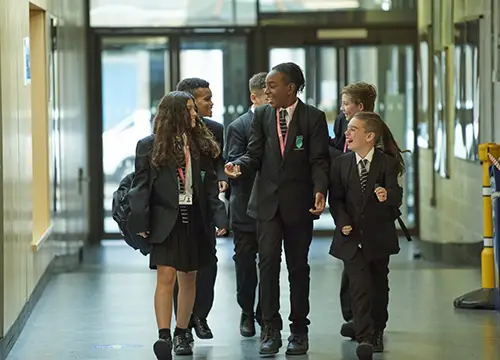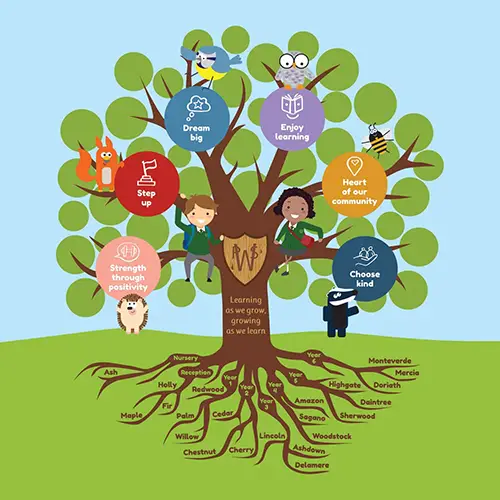This case study was undertaken by an external evaluator (Capsule Research and Evaluation), who interviewed Meirion Lewis, Vice Principal at Southbank University Academy, on his experience of taking part in Big Education’s leadership programmes – Big Leadership Adventure and Big Team Adventure.
"I am far, far more confident than I was, I actually feel like a leader now"
Situated on the Aylesbury estate in Elephant and Castle and down the road from Surrey Square [a school within the Big Education Trust] Southbank University Academy (SBUA) welcomes a mixed demographic of students, with around 70% of Black African heritage, plus a significant proportion of mid-year arrivals from Latin America. This contributes to a higher-than-average population of students with English as an Additional Language (c. 60-70%). There is a high proportion of pupils who are from disadvantaged backgrounds (55% on the pupil premium register); however, the school serves the local estate as well as the wider area, contributing to a mixed social make-up. With the local estate currently in redevelopment to enhance its appeal to young professionals, potential changes to the school’s intake are possibly on the horizon. SBUA operates as part of South Bank Academies Multi-Academy Trust and is sponsored by London South Bank University. A relatively new school (opening its doors in 2014), the school was awarded a ‘Good’ rating from Ofsted in 2017.

Assistant Vice Principal, Meirion Lewis, has been in post for almost 6 years and is due to finish his time on the Big Leadership Adventure programme in July 2022. Prior to this he had been a subject lead at another secondary school. Now, as an Assistant Vice Principal, he felt his role had a much wider scope and required a different set of leadership skills.
Prior to taking part in the Big Leadership Adventure (BLA), Meirion felt that his skillset had been limited by his ‘middle leader mindset’ and his attention had been very much focused around one subject with his staff management extending only to a limited set of his immediate colleagues. This presented challenges he was not familiar with;
“I felt I lacked the ability to understand the bigger picture of how everything slotted together, how to set a culture of leadership in areas outside of my expertise… I wanted to understand what it meant to be a leader of a large organisation, leading people with disparate roles… I didn’t have high self-confidence as a leader and I didn’t have that framework and language to fall back on. I felt I was treading water and if I came across a situation new to me I struggled to navigate it.”
Meirion was also keen to develop ‘authentic’ leadership skills;
“I didn’t want to be a leader who made or forced people to do things. I wanted to be someone who instigates change and encourages change by bringing people on board; by understanding what their needs and issues were and I felt that was an area I wasn’t as strong on.”
Once he was up to speed with the new school setting and his role within that, his priority was to reflect on his approach and develop himself as a leader. He explained:
“I got to the point where the firefighting stopped. I could be more strategic and felt I had to do something. I hadn’t had the opportunity to learn an SLT role. I wanted to improve myself as a leader and find out what it really meant to be a leader. I had started a NPQSL and hated it…I dropped out of it. However, one of my colleagues was on the Big Leadership Adventure and raved about it…”
Ultimately, what appealed most about the Big Leadership Adventure programme was Big Education’s vision around what a school should be:
“I grew up in a deprived area and I was very worried about the education system and feel it has failed a lot of students. I found that Big Education held similar viewpoints to me about the flaws within it.”
Meirion explained how the introductory elements of the programme gave him an opportunity to vocalise his own views of education in order to bring his ideas together and crystallise them into a coherent ‘stump speech’; “It made me bring all those loose threads together and tie them into a coherent order of what I thought education should be.”

The BLA, he explained, provided him with a ‘toolkit to fall back on’ and gave him the skills and the confidence to communicate far more effectively with colleagues at different stages of their careers. He described being ‘less passive’, thinking ‘more strategically’ and better able to share his ideas; “during the course of my career, I have found it difficult to come to the table with my ideas when my line managers have particularly strong personalities, now I am far more able to hold my own in a meeting.” Furthermore, when engaging with his direct reports and teams he is now “more aware and open to what their issues are – I listen better. So I’m more able to guide and lead the team that I line manage as well.”
Given its positive experience of the BLA, SBUA has now decided to take part in the Big Team Adventure (BTA), something which has helped the SLT staff to explore how they operate, communicate and listen to one another’s ideas. Meirion explained; “we found that we were working very much in our own silos and as individuals – so that was very stressful and not very efficient as we were not sharing ideas…”
“Through BLA and BTA, as an SLT we have become far more cohesive and approach things in a more collegiate way. It shows through in the way we approach middle leaders and give them more autonomy to develop. As middle leaders start to rise and grow I think we are going to see more impact. I can see the green shoots have definitely started with middle leaders becoming far more confident and driving things forwards.”
In terms of whole school impact Meirion considers the school’s transition to a ‘design thinking’ approach (informed by BLA learning) to have had the greatest influence. Although some colleagues have expressed frustration at the time spent approaching issues in this way, Meirion has persevered and encouraged others to consider an issue from a multitude of perspectives before forging ahead with a solution. This, he explained has been invaluable in developing his BLA inspired ‘innovation project’ which focused on co-constructing a new approach to assessment and feedback within the school;
“I’ve explained that taking this time to really get under the skin of the issue and ensure everyone is coming along with things means that we will have something that works better than before and has longevity. Over the past few years we have tweaked things so often which is frustrating and confusing for people. There have been pressures for rapid change and improvement (which I fully understand) but I have really pushed back and said we have to go about it in this way. It’s been really beneficial and having that framework and language to put my case forward in the right way has been really useful [due to BLA learning]… I think it will have a huge impact on assessment going forward.”
Developing buy-in at different levels of the school hierarchy has enabled Meirion and his colleagues to make changes which are seeing real impact on individual students and their relationships with them. He explained, “students are definitely able to talk in more coherent terms about their curriculum and their assessment. And that is being led by those middle leaders who have bought into it. We are still working to bring those middle leaders who are more reluctant into it so it is too early to see all the impacts yet but as long as things continue it is looking good.”

Explaining the importance of community engagement further, Meirion said:
“We need to understand the amount of issues that our students are dealing with outside of school. If we don’t support them and understand where they are coming from and meet them where they are, we cannot know exactly why they are reacting to certain situations as they do. We need to understand if they are young carers, their family might be choosing between eating and heating, living in hostels. We might as well stick them in a classroom and support them to learn – but if we don’t support them to come into the classroom in the right frame of mind they are not going to learn a thing… If it’s just exam results and we haven’t supported them with all their issues in life then they are not going to be able to move on successfully in life.”
Striving to be a community driven school very much reflects the vision for education which is shared by Big Education and SBUA. Merion explained that, “Community engagement shows we are not just here for exam results – I’m not diminishing the importance of exam results – but it’s bigger than that; it’s so important we support the community as well… and the early signs are that we are having significant impacts.”
Looking at the wider Academy Trust, Meirion hopes that, by sharing some of their progress with the Executive Head, SBUA can begin to have an impact at the systems level. At SBUA, in the longer term, Meirion hopes to see a stronger middle leadership who are able to drive forward change in the school and a more urgent SLT, moving away from a firefighting approach, with the school “being more embedded and impactful in the community.”
When asked if he would recommend the Big Leadership Adventure programme, Meirion responded, “yes. 100% absolutely. It’s been a huge benefit for me. It has transformed me as a leader. But you need to have the right mindset to take it on – it should be someone who has an open mind, and who is willing to see that our education can be improved and that there are different ways of doing things.”

Big Education Trust is a company limited by guarantee registered in England and Wales.
Company registration number: 07648389.
VAT number: GB142676505
Registered Office: c/o School 21, Pitchford Street, London E15 4RZ
Privacy Policy | Terms & Conditions
| Cookie | Duration | Description |
|---|---|---|
| cookielawinfo-checkbox-analytics | 11 months | This cookie is set by GDPR Cookie Consent plugin. The cookie is used to store the user consent for the cookies in the category "Analytics". |
| cookielawinfo-checkbox-functional | 11 months | The cookie is set by GDPR cookie consent to record the user consent for the cookies in the category "Functional". |
| cookielawinfo-checkbox-necessary | 11 months | This cookie is set by GDPR Cookie Consent plugin. The cookies is used to store the user consent for the cookies in the category "Necessary". |
| cookielawinfo-checkbox-others | 11 months | This cookie is set by GDPR Cookie Consent plugin. The cookie is used to store the user consent for the cookies in the category "Other. |
| cookielawinfo-checkbox-performance | 11 months | This cookie is set by GDPR Cookie Consent plugin. The cookie is used to store the user consent for the cookies in the category "Performance". |
| viewed_cookie_policy | 11 months | The cookie is set by the GDPR Cookie Consent plugin and is used to store whether or not user has consented to the use of cookies. It does not store any personal data. |